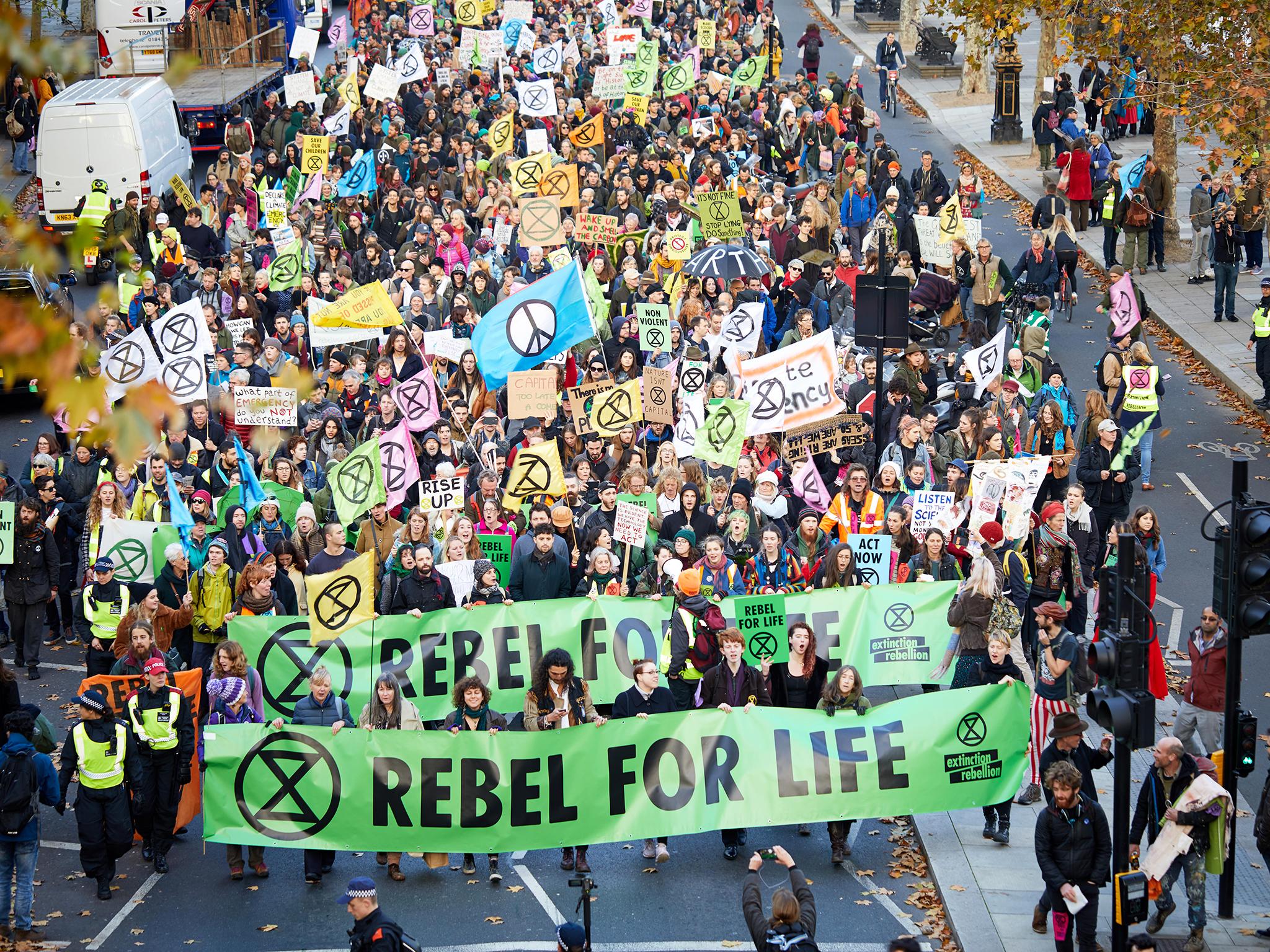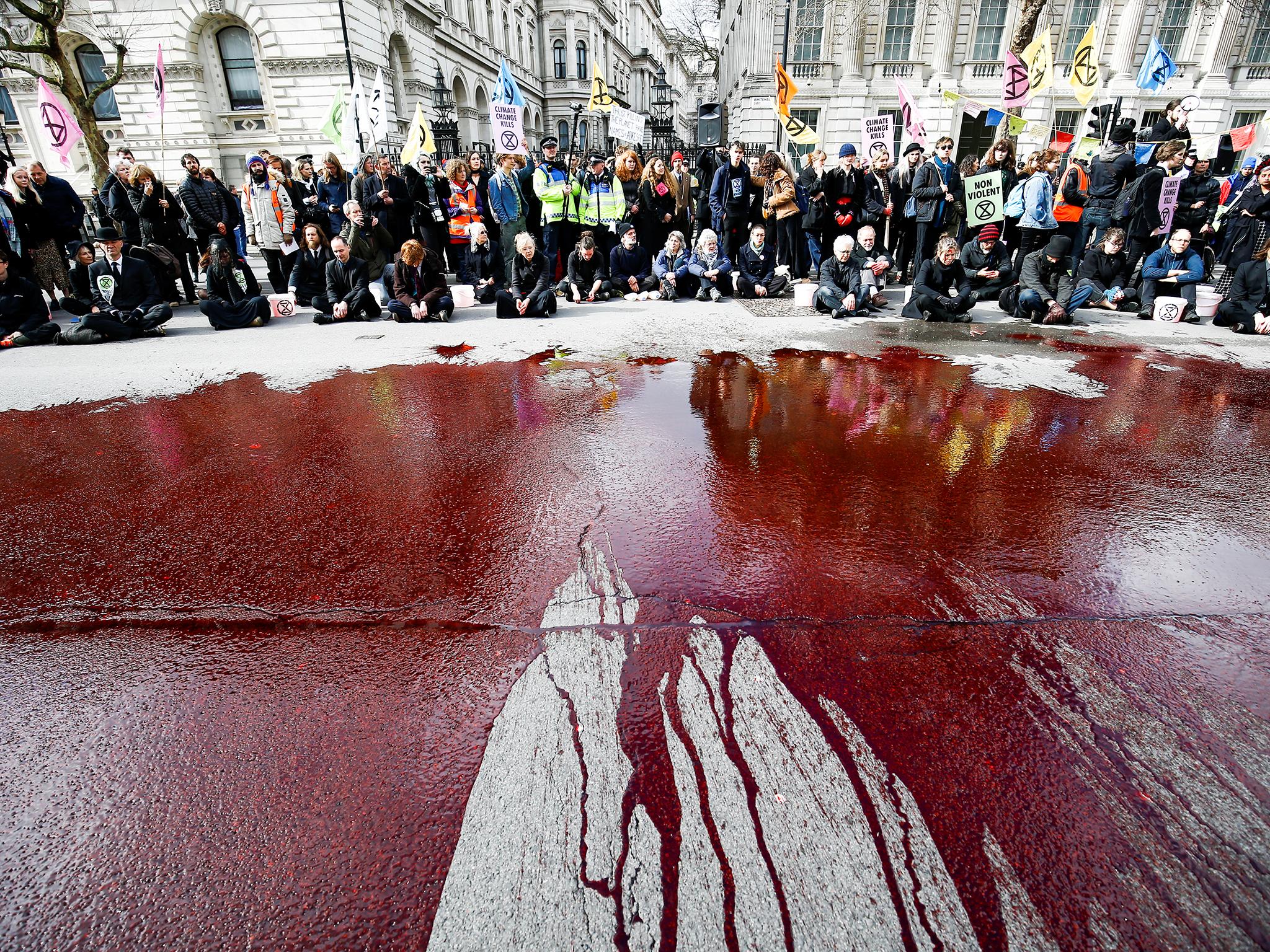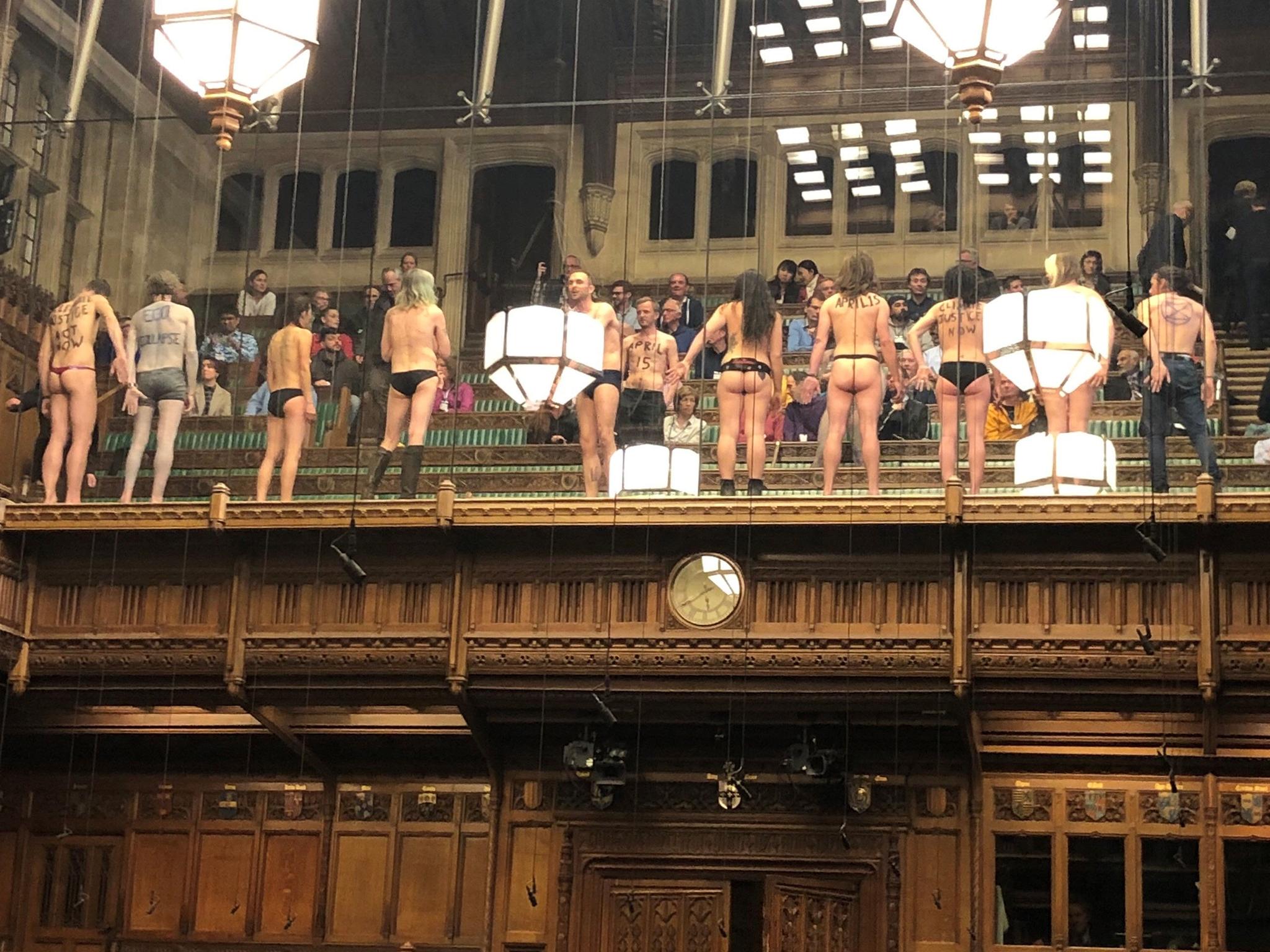Can Extinction Rebellion shut down London and force government to act on climate change?
Supporters have appeared naked in parliament, splashed fake blood across the streets and this week plan to close down London. Jane Fae considers the history and effectiveness of protest


This is it: the week Extinction Rebellion (XR) makes its bid for relevance, notoriety and a place at the Big Table, politically speaking. The environmental group’s plan, very publicly stated, is that unless government agrees to three demands, including telling the truth about climate change and reducing greenhouse gas emissions to net zero by 2025, it will set about progressively closing down London.
Action is also planned in at least a dozen other countries across the world. My Twitter, not to mention my many newsfeeds and Whatsapp groups, is awash with suggestions and bright ideas. Debate is about which actions are likely to come with biggest “bang for buck” – that is, maximum disruption, minimum public annoyance – and which are most likely to alienate wider support. My heart is very much with these activists.
Because it is a disgrace of unparalleled proportion – besides which the Brexit fiasco pales into insignificance – that, faced with existential threat of the magnitude currently facing the planet, our politicians are carrying on with business as usual. And though my heart is with them, my head urges caution. Not because they are wrong, but because as a lifelong rebel, I wonder, now, if it is too late for such tactics: if we have reached a point in the political cycle where extra-parliamentary activity cannot be allowed to be seen to have effect.
As XR has gained momentum there has been a growing critique of its ideas and initiatives from many on the traditional left. As this piece on Open Democracy argues, XR risks falling into the trap of green nationalism; seeking salvation in one country – ours – while abandoning the rest of the world to its fate.
This has always been an issue with green movements. Attachment to Mother Nature seems to bring out the spiritual and dodgy, and too often shades into nationalist and mystic narratives. And this would be a particularly egregious error of perspective. For outright extinction – at least for humanity as a whole – is unlikely unless the current worst case predictions for climate change come true.
Rather it is disaster for non-humans. Disaster too for those (in the northern hemisphere) who are not already stinkingly rich or privileged: you can say goodbye to most minority rights. But as Open Democracy highlights, those who suffer most will be from the southern hemisphere and developing economies.
This would be double (racist) whammy. First, we plunder the natural resources of these countries, polluting the environment and leaving a trail of eco-destruction in our wake. Then those countries whose climates are already on the edge, who will suffer most courtesy of climate change deniers like Trump, will be left to clean up our mess.
As a lifelong rebel, I wonder, now, if it is too late for such tactics: if we have reached a point in the political cycle where extra-parliamentary activity cannot be allowed to be seen to have effect
Elsewhere on Twitter there is a flurry of criticism from the traditional left for whom XR fails to fit into the approved theoretical frameworks: too bourgeois, too middle class or too focused on the self-martyrdom of the privileged to count.
Again, there is some truth to this. There is too much willingness in some quarters to talk about getting arrested as though it is aim or badge of honour rather than by-product of action unpopular with authorities. If getting arrested becomes too much part of the XR ethos, then this will have negative effects.
It risks scaring away all but the hardest core, turning XR from large-scale popular movement to something else: an elite action club or a two-tier movement split between a small cadre of direct-action heroes – and the rest.
I am encouraged from my encounters with XR both locally and nationally to note that people are aware of this problem and are addressing it. I sense much criticism comes from the same people who always make such criticism. Action must be based in “correct” analysis, else it doesn’t count and is to be opposed.

It overlooks the fact that political plans, such as military ones, rarely survive contact with the enemy. The Russian Revolution did not go as planned or anything even close to what pure Marxists expected. This stuff is reminiscent of Labour officials objecting that leftfield action muddied the waters; lacked ideological purity. The same old same old. We will return to that critique before we are done, because it is part of the problem XR is seeking to address.
I have been involved in rebellion of one sort or another for much of my life. That, in turn, is happy consequence of being an active member of the Young Liberals in the early Seventies: a time when two propositions that will seem incredible to anyone born since held true. First that the Young Liberals held, briefly, a position as a radical national movement whose views had some weight in national debates – and left-leaning weight at that. They were numerous enough to act as kingmaker within the Liberal Party. Building on an ideology bequeathed by anti-nuclear, pro-devolution Jo Grimond in the late Sixties they went on to adopt revolutionaries, from founder of modern anarchism Pierre-Joseph Proudhon through to Russian activist/anarcho-communist Peter Kropotkin, as their own.
Liberalism? Perhaps. But in a fashion long since expunged from the British body politic – and quite alien to modern Lib Dems.
At the same time, they achieved national relevance through the accidental coincidence of several factors. In the late Sixties the evil of apartheid, the system of state-endorsed racial segregation instituted in South Africa in 1948, seemed unshakeable. Nelson Mandela, later instrumental in freeing his fellow citizens from the tyranny of whites-only rule was imprisoned, along with other leaders of the anti-apartheid movement. At least, those not already murdered by government.

What to do? National governments were doing what national governments do best; condemning with fine words but little concerted action. Indeed, many were as quick to condemn “intemperate demands for action” as to condemn South Africa: though through the Sixties that was slowly shifting.
The answer came in the form of the Stop the 70 Tour, chaired by Peter Hain, also chair of Young Liberals. Today a staunch supporter of Labour (he joined Labour in the late Seventies) and a pragmatic and practical politician, back then he was a rebellious activist in whom the British Special Branch took more than a passing interest.
It is not hard to understand why. The aim of the Stop the 70 Tour campaign was no secret. It set out to disrupt and ultimately end sporting links between South Africa and Britain. To many of the establishment, this was insufferable cheek – and annoyingly effective.
In 1969, it wrecked the Springbok rugby tour of Britain. Events were besieged by anti-apartheid protesters, pitches invaded and games stopped. For a nation such as South Africa which placed such store in its national sporting prowess, this hurt. The worst was yet to come though, as in December of that year the Test and County Cricket Board (TCCB), forerunner of the England and Wales Cricket Board (ECB), green-lighted a cricket tour. A South African side would tour the UK in 1970; at least, that was the aim.
As the TCCB declared itself “averse to racial discrimination of any kind ... and respected the right of those who wish to demonstrate peacefully”, pressure was already intensifying. On the international stage, Commonwealth countries began to cut sporting ties with the UK. As for peaceful demonstration, some hope, as protests had long since crossed that threshold.
Throughout January cricket clubs up and down the country came under attack – mostly weedkiller poured over the pitch. By the end of the month, 12 county grounds had been vandalised.

By mid-February, faced with a declaration that the only way the tour would go ahead would be behind police cordon, the Marylebone Cricket Club slashed the tour back from 28 to 11 matches. Grounds deemed impractical to protect were removed from the itinerary. Installation of artificial pitches at scheduled venues was approved, so play could continue if the pitch was vandalised mid-match. In May, the inevitable: the tour was abandoned.
A mere 13 when this campaign took place, I focus on it here because it was both formative experience, and also direct action – rebellion – in its purest form. It represented the coming together of several separate strands: as political philosophy, the idea of taking power back to the people; as political PR stunt, leveraging the media impact of clever events to broadcast a message and while the proponents of that campaign may be loath to say as much; it is about disruption and – whisper it low – a form of low-grade terrorism.
Each of those had genesis well before the 1960s, but they came together fortuitously in that campaign. Power to the people emerged from philosophies of collective and co-operative action. Workers co-ops were endorsed as the way to go and all this somehow mushed together with “community politics”, a form of local democracy/bottom-up politics borrowed from the United States and a significant element in the by-election victory of Wallace Lawler in Birmingham Ladywood in 1969.
Oh happy coincidence that ideological localism might find common cause with those more interested in traditional electoral success, and throughout the Seventies Liberals were happy to continue this devil’s bargain – just so long as they were winning by-elections.
Direct action had an even more exalted past. It suited the optimistic mood of the times and, seemingly, offered anti-establishment activists the promise of change through peaceful action. From a fetishisation of Gandhi’s campaign for Indian independence to mass-produced posters of students inserting flowers into National Guard rifles, the idea caught on that revolution could be both painless and twee.
From suffragettes to Greenham Common, from Stonewall to disability rights activists, those outside the establishment have felt empowered to take up the cudgels when they felt excluded from decision making
Publications such as PlayPower and Oz, both closely associated with Australian writer and social commentator Richard Neville, endorsed the idea that political change could be brought about just by exposing the system. Likewise, the Situationist International (SI), an international social revolutionary movement, shifted from art to politics and proceeded to cock two fingers at the establishment throughout the decade.
Its high point was perhaps May 1968, when it played an active part in student unrest in France. Otherwise, though, much of its output was limited to witty deconstruction of the system, rather than on-street activism.
There are two issues here. Direct action – rebellion – is a neutral tool. As such it is at odds with socialist analyses which posit political action as emerging from the economic class – the proletariat – that is also subject to oppression. It is intersectional, in a way that much left politics is not.
That is why it is favoured by minorities. From suffragettes to Greenham Common, from Stonewall to disability rights activists, those outside the establishment have felt empowered to take up the cudgels when they felt excluded from decision making. Sometimes, over the past decade or so, activists have literally taken hammers to military equipment in an attempt to disrupt war-fighting.
They do so because traditional power structures have a tendency to represent the traditionally powerful and have little time for these jack-and-jill-come-latelies demanding the same rights as their members already have. There is much retrospective rewriting of history on the part of the Labour movement which, at various times in the Sixties and Seventies, was less than supportive of the rights of women, non-whites or gay people.

A copious literature has grown up around when it is right, and permissible, to act “unlawfully”.
On the other hand rebellion is a neutral tool. Some of those jumping on the bandwagon include groups and individuals rather less naturally associated with progressive or minority politics: Fathers 4 Justice made headlines with actions aimed at economic disruption. Pro-life campaigners may harass patients at abortion clinics – but in their eyes, they are the heroes in their story.
There’s the rub. There, too, the Achilles heel of Extinction Rebellion.
One of the earliest debates I attended at a National Young Liberals event focused on the Surrey rapist. No, not a real person. A theoretical construct devised to test the appetite for local democracy. How, we were asked, would we react if the people of Surrey, liberated from central control, decided to hang all rapists. Would that be OK?
There was no easy answer to that. There never was. At base it is a replay of the Confederacy question: when the southern American states endorsed slavery, and central government said no – and then fought a war over the issue.
Rebellion is a complex dance: not an event, but a process and interaction between people and power
More to the point, rebellion is a complex dance: not an event, but a process and interaction between people and power. If you embarrass the powerful, they will mostly swallow – and ignore you. They may even join you in a hollow laugh or two. But threaten the base of their power and they will respond. Hard.
In 1919, following agitation for independence, British troops in India locked thousands of Indians – protester and non-protester alike – into a confined space before turning their guns on them.
Hundreds died in what has since been named the Amritsar massacre – though you will be hard pressed to find it reported in British history books.
1968 saw occupation and uprising in Paris. Students went toe to toe with armed police and for a while it looked as though the government might fall. In the same year, Czechoslovakia’s peaceful revolution was brought to an abrupt end with the arrival of Russian tanks. Calm leadership and peaceful resistance may have prevented that from turning bad: peaceful resistance achieved little.
Not even self-immolation changed anything. In 1969, Jan Palach joined a select band of high-profile public suicides against Soviet rule. He has since become a national icon for his heroic suicide. But apart from news headlines and stoking the fires of international outrage, little was achieved.
The difference? Soviet authorities were happy to endure the international opprobrium from shooting a few protesters; the French were not. Proponents of direct action have tended to over-emphasise actions with which they have agreed, ignoring awkward details.
In 1918, women did not win the vote solely through direct action. That had mostly wound up a few years earlier. Rather, they turned their not-inconsiderable clout to support the war effort, demonstrating not merely that they could deliver rebellion, but also support.
The Stop the 70 Tour succeeded in part because of direct action: but it also benefited from wider backing. Commonwealth countries supported it. So too did large parts of the British public and – critical – neither Prime Minister Harold Wilson nor home secretary Jim Callaghan were any friend to apartheid.
In other words, rebellion can succeed when it coincides with other factors. My sense is that the present government will prove uniquely resistant. There are good and bad reasons for that. Public rebelliousness seems to be growing. More disturbing, for government, the proponents of rebellion are talking overt economic disruption.
We may cheer when a lone individual stands up and stops another being deported back to Afghanistan. But the authorities certainly do not.
Nor will they have been amused by recent protests over the absence of Brexit: individuals behind the rolling lorry protest or attempts to stop trains in and out of London also spoke of “rebellion”. What they very clearly meant was economic disruption. Which is also Extinction Rebellion’s intent.
A government more secure in its position might open dialogue with protesters. The evidence, however, from the recent attempt to charge Stansted protesters with terrorism, suggests a government led by the “hard woman from the Home Office” will not. None of this invalidates Extinction Rebellion’s plans. It does suggest, however, that initial reaction will be harsher; the journey longer and harder than some may expect. For those concerned by the seriousness of the threat to our planet, this will not be an obstacle. But, it is a reason for XR to make sure it reaches out, makes allies, and above all else, is ready to dig in for the long haul.
Join our commenting forum
Join thought-provoking conversations, follow other Independent readers and see their replies
Comments